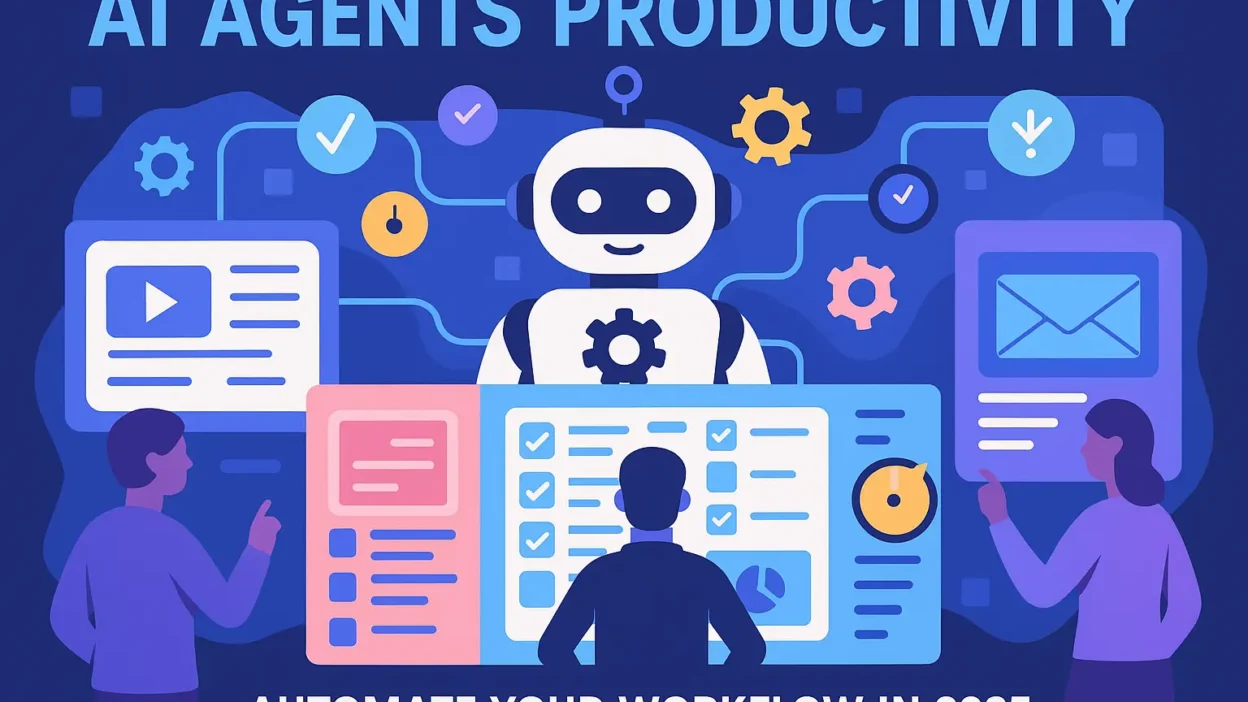Last Updated on August 6, 2025
In 2025, AI agents productivity is one of the most disruptive shifts in how work gets done. Unlike traditional AI tools that answer prompts, AI agents can think, plan, and act across multiple steps — automating tasks and decisions end-to-end.
This guide breaks down everything you need to know about how AI agents productivity tools are transforming workflows in 2025.
Whether you’re a creator, marketer, entrepreneur, or software developer, AI agents are now essential for staying competitive. This guide explains what they are, how they work, and which platforms you should explore right now.
What Is an AI Agent?
An AI agent is an autonomous software assistant that performs actions based on goals and real-time inputs. It doesn’t just respond like ChatGPT — it executes.
Key capabilities of AI agents include:
- Reasoning — breaks down user goals into sub-tasks
- Planning — decides the best sequence of actions
- Memory — stores prior data, preferences, or history
- Execution — takes actions via APIs, tools, or browsers
From content creation to customer service and workflow automation, AI agents handle tasks you’d normally do manually — but faster, smarter, and at scale.
How AI Agents Work to Boost Productivity
AI agents operate on a cognitive loop: observe → plan → act.
Example:
You prompt: “Generate a 7-day social media calendar.”
The AI agent:
- Analyzes past content
- Breaks down the task into writing, design, and scheduling
- Uses tools like Notion, Canva, and Buffer to post — all autonomously
They’re powered by Large Language Models like GPT‑4, Claude 4 Opus, and open-source tools — plus memory components like vector databases and tool access via APIs or browser actions.
Why AI Agents Productivity Matters in 2025
In a world of information overload, AI agents productivity tools help businesses and individuals:
- ✅ Automate repetitive workflows
- ✅ Reduce time spent on manual coordination
- ✅ Free up creative and strategic capacity
- ✅ Operate 24/7 across platforms and tools
- ✅ Scale without hiring more staff
If you’re serious about efficiency, using AI agents is now a competitive necessity — not just a novelty.
Top AI Agents You Can Use Today
These leading platforms represent the best in AI agent productivity for 2025:
| Tool | Best For | Platform Type |
|---|---|---|
| Claude 4 Opus | Planning, coding, large context memory | Chat / API |
| Zapier Canvas | Visual task automation, workflow steps | Visual builder |
| OpenAI GPTs | Custom goal-specific agent creation | Web/API |
| Auto-GPT / AgentOps | Open-source multi-step agents | Python/Local |
Claude 4 Opus, in particular, leads 2025 benchmarks like SWE-bench and Terminal-bench. It also powers over 80 Claude Code subagents for developers and business users.
Benefits of Using AI Agents for Work
Using AI agents can transform your productivity stack:
- ✅ Automate emails, tasks, research, and writing
- ✅ Connect and sync tools like Notion, Slack, and Google Docs
- ✅ Save hours weekly with no-code flows
- ✅ Handle multi-tool, multi-user coordination
- ✅ Replace basic tools with one intelligent assistant
Example: A founder uses Zapier Canvas to connect form submissions to Slack, auto-generate emails, and populate Airtable — without writing a single line of code.
Are AI Agents Safe and Reliable?
Yes — but they require intentional oversight. Key risks include:
- ⚠️ Hallucinations from LLMs (wrong output)
- ⚠️ Misuse of API access if not secured properly
- ⚠️ Over-delegating without human review
Most platforms now support human-in-the-loop designs, activity logs, and permissions to ensure safety and reliability.
Final Thoughts: Should You Use an AI Agent in 2025?
If you’re not using an AI agent yet, you’re missing a competitive advantage.
AI agents productivity tools give you automation, speed, and decision support — freeing you to focus on what matters most. Whether you’re scaling a business, running a team, or launching your first project, AI agents can handle the heavy lifting.
Start small — connect tools, automate one workflow — and build from there.
